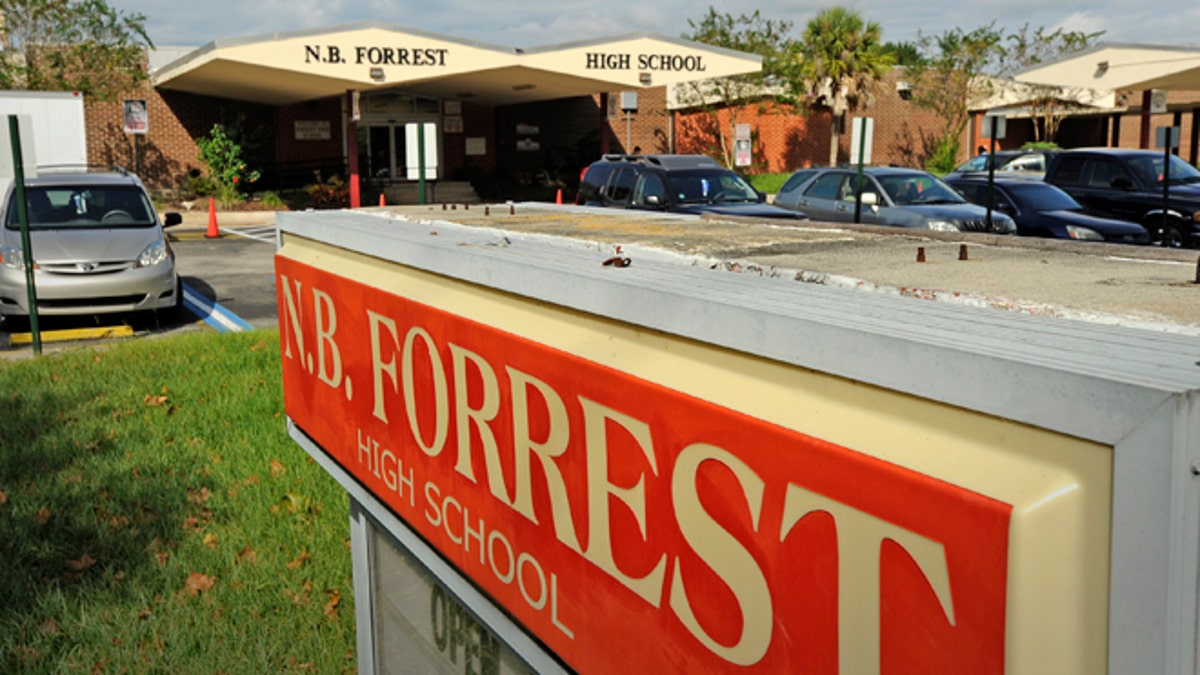
This photo taken on Sept. 30, 2013, shows the exterior of the Nathan B. Forrest High School in Jacksonville, Fla. The Duval County School Board said it was following the will of its students when it voted unanimously on Monday, Dec. 16, 2013, to change the name of school, named for a Confederate general and honorary Ku Klux Klan leader. The change will take place next year once a new name is chosen, said Superintendent Nikolai Vitti. (AP/The Florida Times-Union)
JACKSONVILLE, Fla. – Officials have decided to rename a black-majority high school in Florida now named for an honorary Ku Klux Klan leader who some historical records say ordered the execution of hundreds of black soldiers during the Civil War.
The board that oversees Nathan B. Forrest High in Jacksonville said it was following the will of its students Monday when it voted unanimously to change the name. The switch will take place next year once a new name is chosen, said Nikolai Vitti, the superintendent of Duval County schools.
Vitti said a majority of students surveyed voiced support for dropping Forrest's name, given his history as a slave trader and some accounts that blame him for issuing an order to execute captured black soldiers who fought for the Union side during the Civil War. Forrest was a general in the Confederate rebel army and was later named honorary Grand Wizard of the Klan.
About half of the faculty and a majority of alumni surveyed disagreed with the name change, but 64 percent of students were in favor of dropping the name. The school board said it based its decision on what the students wanted.
Vitti said he hopes students realize that they can make a difference. He said he will now conduct a survey to decide the new name, and the board is expected to decide on it early next year.
"Everybody is glad about it," De'jia Boatwright, a 15-year-old at the school.
The removal of the names of key Confederate figures, some of whom participated in the early days of the Ku Klux Klan, is trending through the South and other parts of the U.S.
For years, communities have been trying, sometimes successfully, to change names of schools, parks and other facilities because they represented Confederate leaders and ideals. But many defend the names, arguing they commemorate the South's heritage, not racism.
The name of the Jacksonville school has been a source of controversy for decades, with school officials continuously refusing to change it despite numerous protests. Opponents of the name change told the school board it would be a waste of money, based on history that may be inaccurate.
"This issue happened 150 years ago," said Jim Taylor, a 1978 Forrest graduate. "We have to move on. Let the issue go. If you guys change the name, this could be a waste of taxpayer money."
Forrest High opened as an all-white school in the 1950s. Its name was suggested by the Daughters of the Confederacy, an organization of women descendant of people who served the rebel army during the Civil War. The organization saw the name as a protest to the 1954 Supreme Court ruling that eventually integrated the nation's public schools.
Born poor in Tennessee in 1821, Forrest amassed a fortune as a plantation owner and slave trader, importing Africans long after the practice had been made illegal. At 40, he enlisted as a private in the Confederate army at the outset of the Civil War, rising to a cavalry general in a year.
In 1863, President Abraham Lincoln signed the Emancipation Proclamation that declared free all slaves held in Confederate states rebelling against the Union. Two years later, the 13th Amendment of the Constitution outlawed slavery.
Some accounts said Forrest ordered black prisoners to be massacred after a victory at Tennessee's Fort Pillow in 1864, though historians question the validity of the claims.
In 1867, the newly formed Klan elected Forrest its honorary Grand Wizard or national leader, but he publicly denied being involved. In 1869, he ordered the Klan to disband because of the members' increasing violence. Two years later, a congressional investigation concluded his involvement had been limited to his attempt to disband it.
After his death in 1877, memorials to him sprung up throughout the South.

